Learning a Foreign
Language
Learning a Foreign
Language
Understanding the Fundamentals
of Linguistics
Alex Poole
ROWMAN & LITTLEFIELD
Lanham Boulder New York London
Published by Rowman & Littlefield
An imprint of The Rowman & Littlefield Publishing Group, Inc.
4501 Forbes Boulevard, Suite 200, Lanham, Maryland 20706
www.rowman.com
6 Tinworth Street, London SE11 5AL, United Kingdom
Copyright 2020 by Alexander Poole
All rights reserved. No part of this book may be reproduced in any form or by any electronic or mechanical means, including information storage and retrieval systems, without written permission from the publisher, except by a reviewer who may quote passages in a review.
British Library Cataloguing in Publication Information Available
Library of Congress Cataloging-in-Publication Data
Names: Poole, Alex, author.
Title: Learning a foreign language : understanding the fundamentals of linguistics / Alex Poole.
Description: Lanham, MD : Rowman & Littlefield Publishers, 2020. | Includes bibliographical references. | Summary: This book introduces aspiring bilinguals to second language acquisition research, but in a way that is accessible to non-specialists and relevant to their lives as language learners Provided by publisher.
Identifiers: LCCN 2020009588 (print) | LCCN 2020009589 (ebook) | ISBN 9781475854176 (cloth) | ISBN 9781475854190 (epub)
Subjects: LCSH: Second language acquisition.
Classification: LCC P118.2 .P657 2020 (print) | LCC P118.2 (ebook) | DDC 418.0071dc23
LC record available at https://lccn.loc.gov/2020009588
LC ebook record available at https://lccn.loc.gov/2020009589
 TM The paper used in this publication meets the minimum requirements of American National Standard for Information Sciences Permanence of Paper for Printed Library Materials, ANSI/NISO Z39.48-1992.
TM The paper used in this publication meets the minimum requirements of American National Standard for Information Sciences Permanence of Paper for Printed Library Materials, ANSI/NISO Z39.48-1992.
Preface
In a sense, this book started the moment I realized the world contained more than one language. That happened when I was a small boy, many years ago. My grandmothers first language was Yiddish, the language of Eastern European Jewry. Both she and my grandfather also spoke French. When I heard these and other languages during childhood, I sensed a certain magic was being performedand I wanted to be part of the show. It should therefore come as no surprise that my childhood friends had recent roots in Europe and Asia. I loved asking their parents and grandparents about their first languagesArabic, Frisian, German, Sindhi, and Urduand where they learned English.
That Sioux City, Iowa, was the setting might seem unusual, but it really shouldnt. Immigrants have settled all parts of the United States, and multilingual environments arent limited to major metropolitan areas. In fact, the majority of the world speaks more than one language. For most, it isnt a big deal. Parents sometimes come from different ethnic groups, nations often have multiple cultures, and the languages of school, government, and television are frequently not the ones spoken at home.
While I learned about the normality of language learning from these childhood conversations and extensive travel, it wasnt until graduate school that I understood how it was done. Before that time, I struggled to learn languages. Great initial enthusiasm for Russian, Slovene, and Hebrew quickly waned. Not only were opportunities for practicing these languages quite limited, but American culture placed a low value on attempting to speak them. Discouraging messages about American language learners often involved mockery and emphasized the futility of even trying. That they came from both monolingual Americans and multilingual Europeans didnt help matters.
More significant was my ignorance about the process of language learning. As a late teen and young adult, I had no idea what to do or expect. This was worsened by erroneous beliefs which led to counterproductive practices and unrealistic goals. A PhD in linguistics and years of study helped change all of this, however, and I have achieved my goal of learning another language. While I dont sound like Antonio Banderas and probably never will, I function at a high level in Spanish. Interactions with my Colombian in-laws are no problem, I can understand most written and oral versions of the language, and impromptu conversations get off the ground quite easily. I have even given a few lectures in Spanish.
Most Americans wishing to learn another language wont pursue a doctorate in linguistics. Thankfully, this isnt necessary. Of course, hard work and patience are required, but nature has provided humans with the underlying tools to learn another language. It isnt like being a great athlete or mathematical genius. It is the rule rather than the exception. Learners merely need to understand some fundamentals of the phenomena involved in the process and act accordingly. This book aims to help them do both.
Introduction
Audiences for This Text
This text is intended for those wishing to learn another language: specifically, individuals who primarily or exclusively speak English. Some readers may have already studied one or several languages, feel frustrated by their lack of progress, and want to move ahead. Others may just be starting their first foreign language and are looking for guidance. Still others may be seriously considering language study but need to find out a little more before making a commitment.
Professional linguists and those with graduate degrees or advanced training in language-related fields should not view the text as breaking new ground, nor should they expect a comprehensive analysis of all issues presented. The dynamics involved in learning multiple languages will not receive coverage in this text. Instead, it will focus on first-time learners. Other than good reading skills, no particular academic background is needed to understand the concepts presented here, making it appropriate for high school students, college language majors, and those independently pursuing a language. Future teachers of any foreign language will find the text relevant for both their students and themselves.
What Readers Should Expect
The books contents can benefit current or would-be language learners who lack the time, background, or desire to consult linguistics texts to gain insight into the process and make informed decisions. Nonspecialists rightfully complain that scholarly books and journals feel impenetrable and fail to generate enthusiasm for learning. While this text captures the knowledge found in academic publications, it packages it in a way that seeks to be both accessible and inspiring.
Each chapter highlights key issues involved in language learning. Readers will receive a general overview of their importance, examine the relevant research, and become aware of the benefits of and obstacles to real-life applications. By doing so, readers will also increase their understanding of the methods and techniques used to generate research questions and analyze data, in addition to fundamental areas of linguistics, such as first-language acquisition, the connection between language and thought, the evolution of language, and cultures relationship to language.
Readers should emerge as informed language learners with a suite of potential ideas for helping themselves and others. However, they will not walk away with one-size-fits-all procedures which guarantee specific outcomes. This is not a how-to book in the typical sense of the term. The challenges of language learning will not magically disappear, nor will readers be prepared to master all aspects of a language within six months. Specific outcomes cant be promised.
Next page

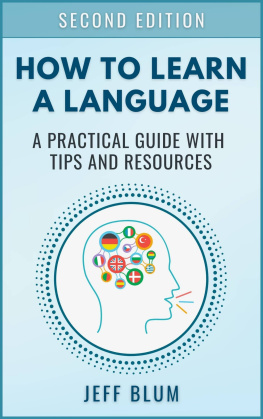

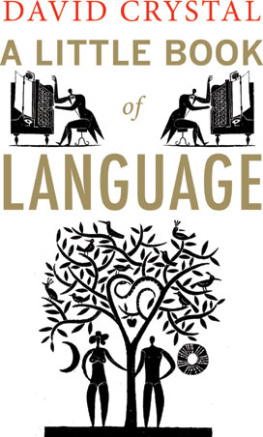
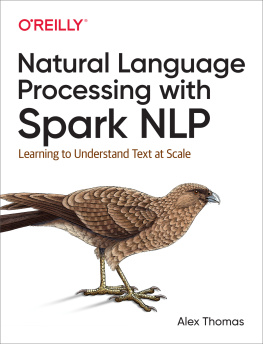
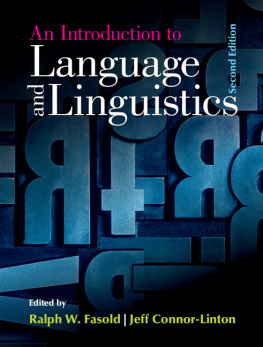
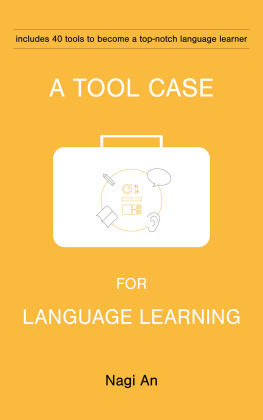

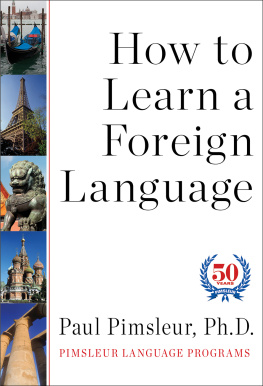

 TM The paper used in this publication meets the minimum requirements of American National Standard for Information Sciences Permanence of Paper for Printed Library Materials, ANSI/NISO Z39.48-1992.
TM The paper used in this publication meets the minimum requirements of American National Standard for Information Sciences Permanence of Paper for Printed Library Materials, ANSI/NISO Z39.48-1992.